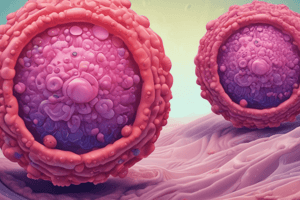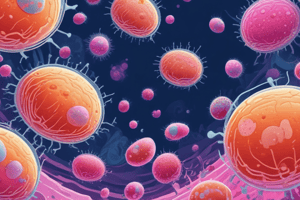Podcast
Questions and Answers
What is a characteristic of Neisseria weaveri?
What is a characteristic of Neisseria weaveri?
- It requires high levels of oxygen for growth.
- It is primarily found in marine environments.
- It is a fastidious organism. (correct)
- It is a commensal in the upper respiratory tract of cats.
Which age group has the highest rates of gonorrhea infection?
Which age group has the highest rates of gonorrhea infection?
- Men and women ages 30 to 34
- Men and women ages 15 to 19
- Men and women ages 25 to 29
- Men and women ages 20 to 24 (correct)
Why are Neisseria spp. considered opportunistic pathogens?
Why are Neisseria spp. considered opportunistic pathogens?
- They thrive in marine environments.
- They have a common reservoir in birds.
- They are the only pathogens causing sexually transmitted infections.
- They can cause infections when the host is immunocompromised. (correct)
What is required for the growth of fastidious organisms, such as those in the Neisseria genus?
What is required for the growth of fastidious organisms, such as those in the Neisseria genus?
What is true about gonorrhea as a national reportable disease?
What is true about gonorrhea as a national reportable disease?
What is the most common site of infection in women related to clinical infections?
What is the most common site of infection in women related to clinical infections?
Which of the following is NOT a symptom of clinical infections in women?
Which of the following is NOT a symptom of clinical infections in women?
What type of swabs should NOT be used for collecting specimens for Neisseria gonorrhoeae?
What type of swabs should NOT be used for collecting specimens for Neisseria gonorrhoeae?
Which of the following complications can arise from pelvic inflammatory disease?
Which of the following complications can arise from pelvic inflammatory disease?
What is the proper depth for inserting a swab into the anal canal for a rectal culture?
What is the proper depth for inserting a swab into the anal canal for a rectal culture?
Which statement correctly describes the general characteristics of most Neisseria species?
Which statement correctly describes the general characteristics of most Neisseria species?
Which virulence factor is specifically associated with Neisseria meningitidis?
Which virulence factor is specifically associated with Neisseria meningitidis?
What is the primary natural habitat for pathogenic Neisseria species?
What is the primary natural habitat for pathogenic Neisseria species?
Which of the following is NOT a primary site for Neisseria gonorrhoeae infection?
Which of the following is NOT a primary site for Neisseria gonorrhoeae infection?
Which characteristic distinguishes Neisseria gonorrhoeae in terms of its natural host?
Which characteristic distinguishes Neisseria gonorrhoeae in terms of its natural host?
What is the typical incubation period for gonococcal arthritis?
What is the typical incubation period for gonococcal arthritis?
Which of the following is the most common cause of anal canal infections in men?
Which of the following is the most common cause of anal canal infections in men?
Which symptom is NOT commonly associated with acute gonococcal infection in men?
Which symptom is NOT commonly associated with acute gonococcal infection in men?
What percentage of infected women may develop anorectal infections?
What percentage of infected women may develop anorectal infections?
What is the primary complication associated with untreated gonococcal infection in newborns?
What is the primary complication associated with untreated gonococcal infection in newborns?
What preventive measure is recommended for newborns to avoid gonococcal infection?
What preventive measure is recommended for newborns to avoid gonococcal infection?
Which statement about asymptomatic gonococcal infections in men is correct?
Which statement about asymptomatic gonococcal infections in men is correct?
What is the common manifestation of acute gonococcal infection in men?
What is the common manifestation of acute gonococcal infection in men?
Flashcards are hidden until you start studying
Study Notes
Neisseria General Characteristics
- Most Neisseria species are aerobic, non-motile, non-spore forming, and gram-negative diplococci.
- Cytochrome oxidase positive and catalase negative (exceptions include N.elongate subsp., Nitroreducens, and N.bacilliformis).
- Capnophilic; capable of anaerobic growth with nitrites as alternative electron acceptors.
- Natural habitat includes mucous membranes of respiratory and urogenital tracts.
- Primary human pathogens: Neisseria gonorrhoeae and Neisseria meningitidis.
- Neisseria weaveri is a commensal organism found in dogs.
Pathogenic Neisseria spp. Virulence Factors
- Possess receptors for human transferrin, allowing iron acquisition.
- N. meningitidis has a capsule and pili (fimbriae) for adhesion.
- Produce specific cell membrane proteins and lipooligosaccharide (LOS) which acts as an endotoxin.
- Immunoglobulin A (IgA) protease cleaves IgA on mucosal surfaces.
Neisseria gonorrhoeae Overview
- Exclusive natural host is humans and the primary agent of gonorrhea.
- Infection sites: urethra, endocervix, anal canal, pharynx, and conjunctiva.
Epidemiology
- Transmitted primarily through sexual contact; asymptomatic carriers serve as the main reservoir.
- Confirmed cases of gonorrhea are reportable to state health authorities.
- Highest infection rates among individuals aged 20 to 24.
- Gonorrhea ranks second to Chlamydia trachomatis in sexually transmitted bacterial infections in the US.
Clinical Infections
- Incubation Period: Approximately 2 to 7 days.
- Gonorrhea Symptoms:
- Acute pyogenic infections typically in the urogenital tract, pharynx, and conjunctiva.
- Complications include disseminated infections and anorectal infections; 30% to 60% of women with genital infection may develop anorectal infections.
Clinical Infections in Men
- Transmission: Occurs through intimate sexual contact, with 90% showing symptoms.
- Common Symptoms: Acute urethritis and dysuria; asymptomatic cases are uncommon.
- Complications: Prostatitis, urethral stricture, and epididymitis can arise from untreated infections.
Clinical Infections in Women
- Common Infection Site: Endocervix, often presenting with dysuria and cervical discharge.
- Symptoms may include lower abdominal pain; 50% are asymptomatic.
- Potential complications include pelvic inflammatory disease, sterility, and ectopic pregnancy.
Disease in Newborns
- Ophthalmia neonatorum can occur if an infant is born through an infected canal, risking blindness without immediate treatment.
- Erythromycin eye drops are used for prevention at birth to protect against infection.
Specimen Collection and Transport
- Preferred specimen sites include rectal, oral/pharyngeal, eye, and blood/joint fluids.
- Recommended swabs for collection are Dacron or rayon; avoid calcium alginate and cotton swabs as they inhibit N. gonorrhoeae.
- Direct plating of specimens on gonococcal-selective media is optimal for culture.
Studying That Suits You
Use AI to generate personalized quizzes and flashcards to suit your learning preferences.




